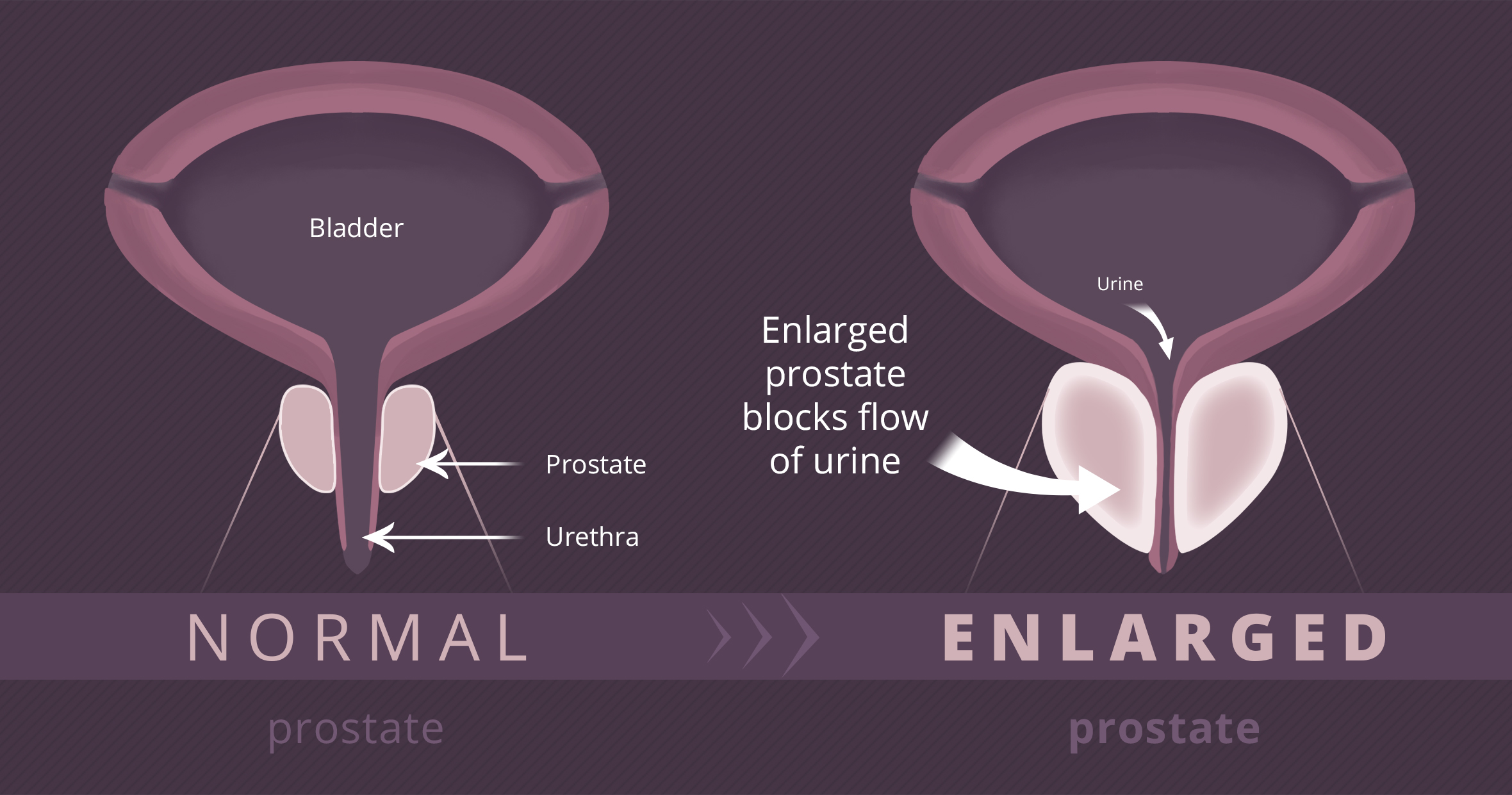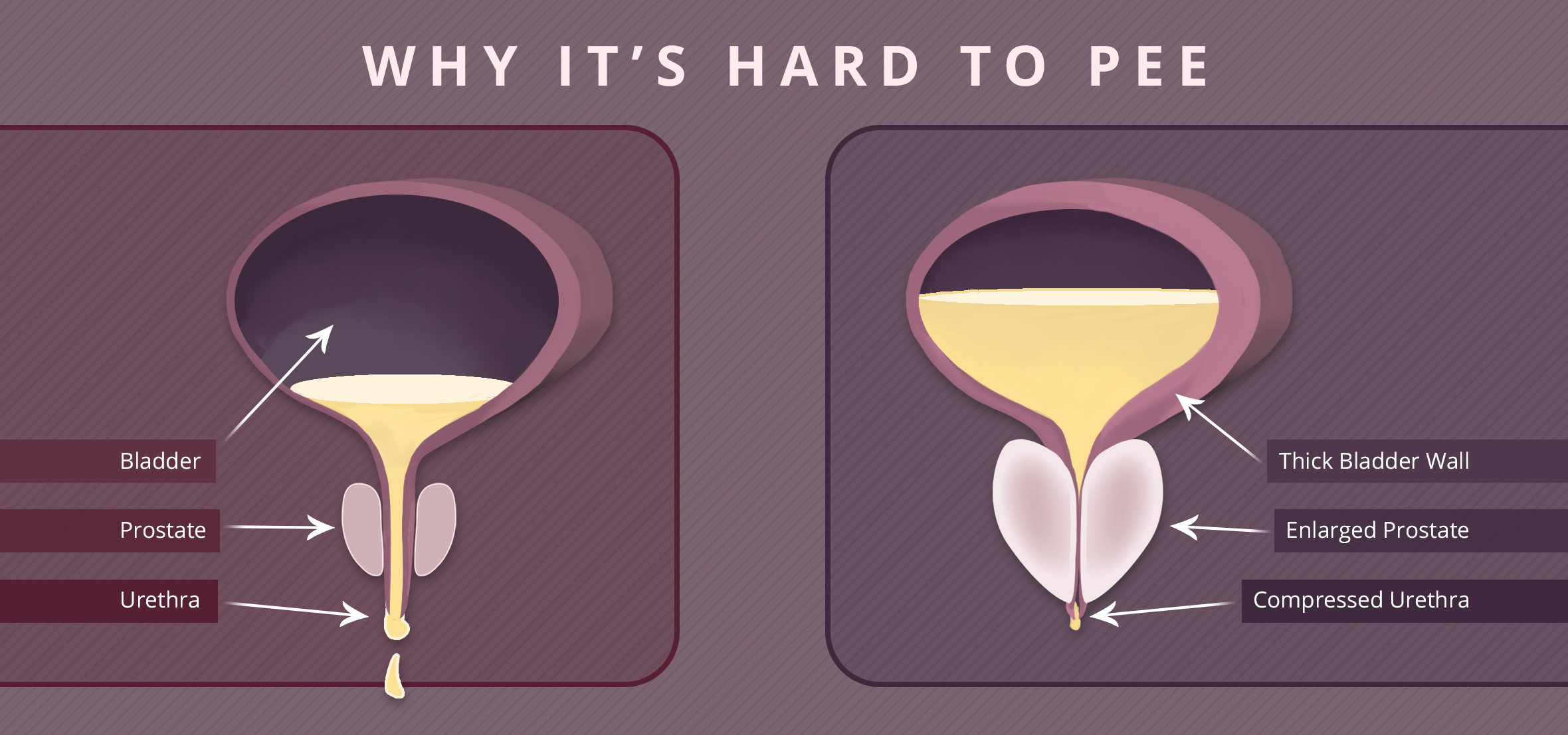Benign Prostatic Hypertrophy, or BPH, is one possible medical cause behind an enlarged prostate. This is a pretty common condition and usually nothing serious (hence the “benign” qualifier). In fact, over half of men ages 50+ show symptoms of BPH. But it does share symptoms with the early stages of prostate cancer, so it’s important to be aware of the difference.
First of all, what is a prostate gland?
The prostate gland is located below the bladder in men and produces fluid components of semen. It secretes fluid that nourishes and protects sperm. A healthy adult prostate weighs about 20–25 grams (2/3 to 3/4 of an ounce). It measures 4 x 2 x 3 centimeters (1.6 x 1 x 1.2 inches).
What causes BPH?
No one knows why the prostate continues to enlarge throughout a man’s life. Hormones like testosterone, dihydrotestosterone (DHT), and estrogen may be involved in regulating the growth of the prostate. It can also result from sex hormones and growth factors that interact with your prostate tissue, which in turn causes irregular growth. Age is also an important factor.
Having a vasectomy and sexual activity do not increase the risk of getting BPH.
Who is at risk?
Several factors contribute to your risk for developing BPH.
Aging
BPH is more common in men ages 50+
Family History
Having a blood relative (father, uncle, brother) with prostate problems increases the likelihood that you’re genetically predisposed to BPH
Ethnicity
Studies show that prostate enlargement is less common in Asian men
What are the symptoms of BPH?
Having to urinate more, often at night. The reason is that the enlarged prostate gland presses on the urethra, which carries urine out of the body. Because of this pressure, the bladder muscles have to work harder to excrete urine. The bladder eventually may start to contract even when only a small amount of urine is present, creating the urge to urinate more often.
It may also take longer to initiate a urine stream. Urinating with a weaker flow or dribbling urine is also very common. You may also feel that there is still urine inside the bladder, even after you have finished urinating.
Do all men get it?
The prostate gland grows throughout a man’s life, starting at puberty and again from age 25 onward. Typically, there are no symptoms from an enlarged prostate before age 40. Up to 90% of men have symptoms of BPH by age 85, but only about one-third of men with BPH symptoms are bothered by the symptoms.
Will BPH lead to Prostate Cancer?
Let’s get one thing clear: BPH isn’t cancer and it doesn’t cause cancer. That said, some of the symptoms of BPH are the same as those of prostate cancer, so many men are fearful of the symptoms. However, BPH is far more common than prostate cancer. If you do develop any of the symptoms, it’s best to go to your doctor and get screened.
How do we treat BPH?
This depends on how severe your symptoms are. “Waitful watching” and close follow up with your doctor is a good option if you have mild symptoms.
Are there any lifestyle changes I can make?
There are! Here are a few recommended ways to relieve symptoms of BPH:
- Avoid alcohol and caffeine
- Avoid drinking fluids at bedtime, and drinking smaller amounts throughout the day
- Avoid taking decongestant and antihistamine medications
- Get regular exercise
- Make a habit of going to the bathroom when you have the urge
- Practice double voiding (empty the bladder, wait a moment, then try again)
- Practice stress management and relaxation techniques
I’ve heard that there are pills I can take to help with my symptoms.
Your doc will tell you if you need a pill. This is how they work…
Drugs to improve your urine flow: Alpha blockers help relax the muscles in the bladder and prostate, allowing urine to flow more freely. They also relax the muscles in your arteries so it also helps with high BP.
Drugs to slow the growth of the prostate gland: It does this by lowering the production of a hormone (that increases prostate size)
What About Surgery?
When medicines are not effective for symptom relief, procedures to remove excess prostate tissue can be considered. When medicine is no longer effective, a surgeon can go in an get rid of the excess prostate tissue. My surgical counterpart, a urologist or a kidney surgeon, handles this. I would be happy to give you a referral! (714) 435-0150


